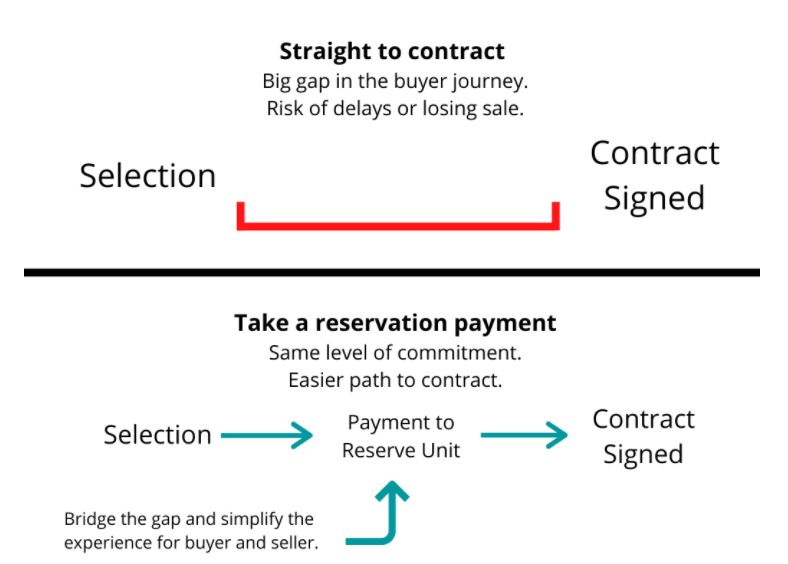It can be difficult for a sales person to guide a buyer past this point when the next step after selection is sending a massive PDF contract. It’s not easy to convince a buyer to buy and it’s even harder when remote or virtual sales are becoming more of a necessity. It’s quite a big gap in the buyer journey and going straight to contract could cause delays or even a lost sale.
So how do we bridge the gap between picking a home and signing the contract? There needs to be a middle ground, another step between selection and signing the contract that doesn’t impede or dissuade the buyer. Taking a reservation payment is a simple next step that provides that middle ground for the buyer so that they don’t feel like they need to go straight to a contract. And in addition to appeasing your buyer, there are two additional benefits to using a reservation system.

First of all, it is a massive challenge for real estate developers to get a buyer to commit to a home by signing a contract. Taking a reservation prior to signing the contract is a way of actually getting commitment from the buyer sooner and with less friction. What makes that so powerful to a developer is the actual collection of money. By using a reservation system like OffPlan, all a buyer has to do is enter the same information they would when online shopping. It’s a relatively low barrier to commitment for the buyer and the developer can be much more confident moving forward. Stepping back and only asking for the reservation removes the barrier, and the developer is getting a very comparable level of commitment through the deposit.
The second added benefit to taking reservations is that it helps with negotiations. Once both the buyer and sales representative have skin in the game, negotiating final pricing and upgrades becomes much more fruitful. It gives buyers the ability to negotiate and the developer is more willing to do so with earnest funds. Earnest funds demonstrate that the buyer is serious and willing to demonstrate an earnest of good faith about wanting to complete the transaction. Let’s say the buyer has selected a home, made the reservation payment with their credit card, and has negotiated more closet space in their new home – the stage is perfectly set to close the deal. By that point there should be no more objections or delays to signing the contract and the buyer feels more comfortable and in control of the buying process. This aspect is prevalent within the townhome market. The purchasers are end users who will want to add and subtract since they are actually going to live in the home. They actually care about the size of the closet. They’re not just worried about their return, they’re worried about living happily and comfortably.
Why do we need to take the extra step between selection and contract? The dynamics of new home sales are changing, and this includes how we sell on an individual basis. Navigating a buyer from selection to signing the contract classically takes a lot of salesmanship. Through marketing, various digital tools and solutions are used and by then the buyer has been shown everything. Now the last bridge to cross is confirming the home they’re choosing and finally writing the contract. It comes down to the ability of the salesperson, but when selling virtually (as many have had to start doing), that gets difficult. They can’t give buyers the kind of nudge that they could in the sales centre when sitting in front of a contract. What they can do is offer a simpler path to purchase.
New home sales teams are ultimately looking for commitment from their buyer. The buyer wants to be eased into the contract, not slammed into it. Using a reservation system when selling a new construction home is beneficial for both buyer and developer and enables the sales team to do what they do best.
Interested in hearing more about taking reservations on your next townhome project? Connect with us today.




